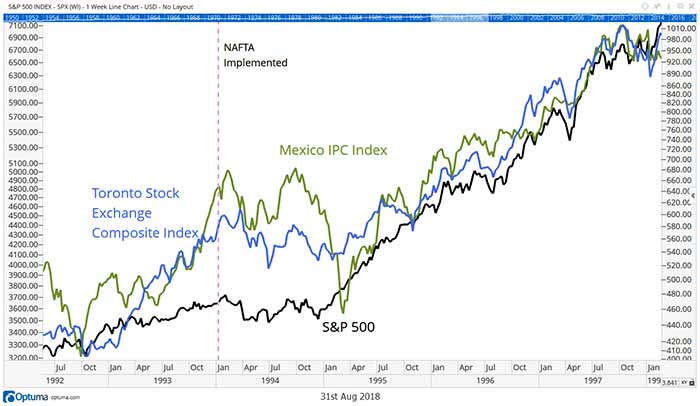After the United States and Mexico announced a new trade deal, analysts turned their attention to Canada. Some worry that Canada could scuttle the North American Free Trade Agreement (NAFTA) by refusing to sign the new accord.
NAFTA is a trade deal between the U.S., Mexico and Canada that took effect in 1994.
Proponents argued it would create an economic boom. Skeptics worried Mexico would suck jobs out of the U.S.
As presidential candidate Ross Perot explained at the time: “We have got to stop sending jobs overseas. It’s pretty simple: If […] you don’t care about anything but making money, there will be a giant sucking sound going south.”
Traders disagreed. They shrugged off the news of the treaty.

The chart above shows benchmark stock market averages for the three countries.
The black line shows the S&P 500 Index, a benchmark for U.S. stocks. Hopes for Mexican stocks, the green line, were high. The same was true for Canadian stocks, the blue line.
But after the agreement took effect, stocks in all three countries moved sideways. NAFTA didn’t have a long-term bullish effect on stocks.
In fact, a year after the agreement, Mexican stocks plunged.
That’s because NAFTA didn’t create anything. It just shifted some jobs between the three countries.
Right now, we see the same thing. Tariffs won’t create jobs. Government mandates won’t create wealth. Jobs will shift in response to demand.
But it costs billions to build modern factories. Companies don’t immediately spend billions to save a few dollars in wages.
That means traders won’t react to new trade agreements. News reporters will.
Instead, traders will focus on earnings. And in the long run, earnings are growing in the U.S. because wages are growing.
Wages should continue growing, and that is bullish for stocks in the U.S. Traders hoping for a surge in Mexican stocks should consider history and avoid that country for now. The same is true in Canada.
Those countries will grow if government policies support growth. Trade agreements will never be enough to lift mature economies to new levels.
Regards,

Michael Carr, CMT
Editor, Peak Velocity Trader




